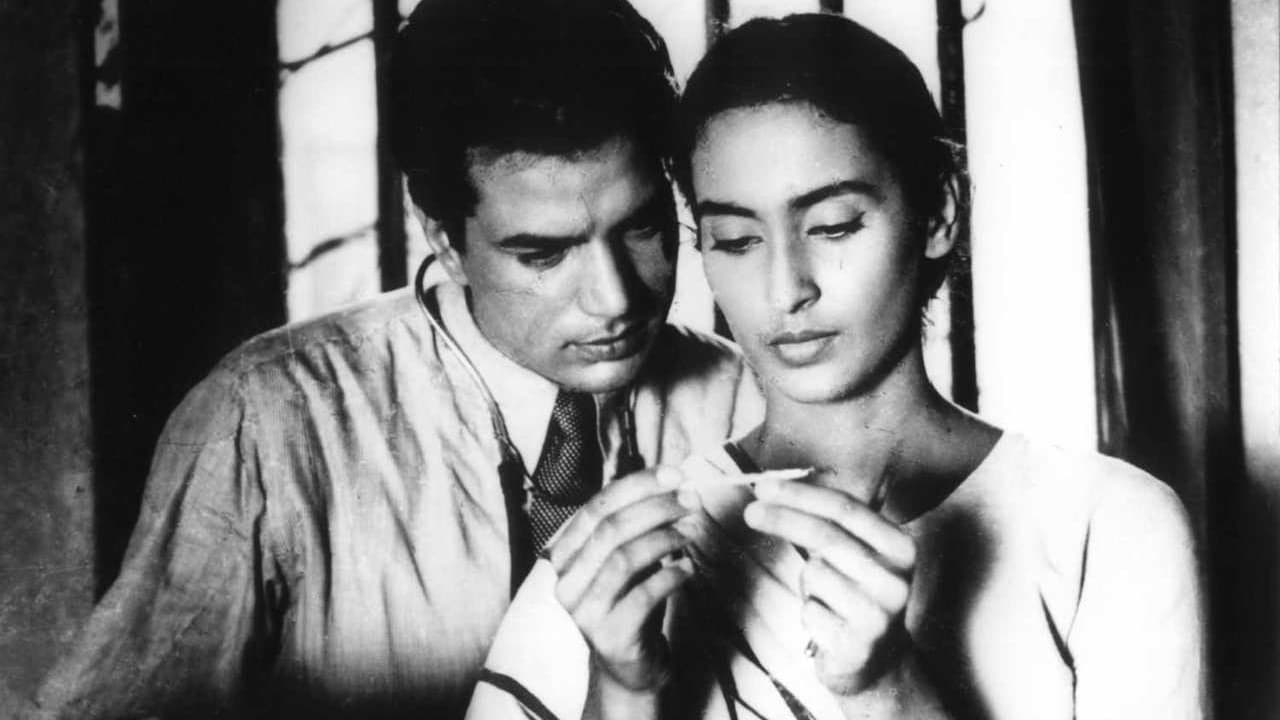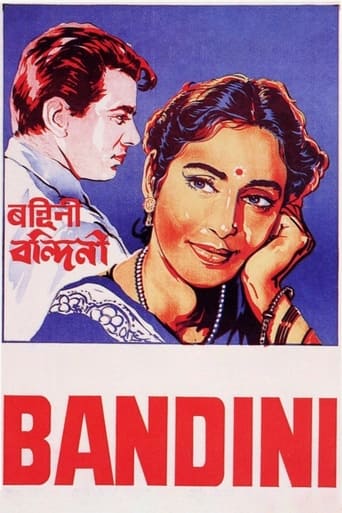BootDigest
Such a frustrating disappointment
Mischa Redfern
I didn’t really have many expectations going into the movie (good or bad), but I actually really enjoyed it. I really liked the characters and the banter between them.
Guillelmina
The film's masterful storytelling did its job. The message was clear. No need to overdo.
Fleur
Actress is magnificent and exudes a hypnotic screen presence in this affecting drama.
brotherdeacon
Vintage Bollywood films are a new source of wonder for me. With less than ten titles under my belt, I still enjoy the big-eyed optimism of a neophyte, and being something of a film buff in other genres, the critical demands of a cranky old art-house fop. That being my background, I approached Bimal Roy's film, Bandini, with few expectations and was pleasantly surprised, so pleasantly. The intelligently-handled scenes by director Bimal Roy took me back to a few of the great American and French directors of the 1930's, when realism was eschewed for style, and drama was willing to risk sentimentality if it meant giving strength to the ultimate story. The type of film-making I'm thinking of was a breeding ground for humanism's values, complete with conflict, tears, and heroic resolution. In Hollywood, Frank Borzage would be one example, early Capra was another, even the uber-stylist, Von Sternberg. And in France, similarities can be identified with the work of between-the-wars Renoir and a slightly later Yves Allegret. But, of course, what these forerunners to the Bandini movie didn't utilize, and which so many Hindi films demand, is the placement of musical numbers. The musical numbers in Bandini were excellent, not an easy accomplishment given that the dramatic story-line takes place in a woman's prison during the Raj's last dark chapter before Indian independence. Not exactly Ethel Merman territory. The musical compositions and lyrics in Indian movies during 1963, the year of Bandini's release, were still in it's golden era, and playback singers were being revered as national treasures. Listening to the voices of Asha Bosle and Lata Mangeshkar delivering S.D. Burman compositions is a treat to remember for a long time. And though I only know the lyrics through subtitles, their poignancy seemed a very high mark in the marriage of lyric, music and story.Which brings me to the real revelation of this film, the extraordinary actress Nutan, as she developed our lead prisoner's character into the embodiment of a strong-willed yet tender heroine of considerable depth and spirit. She captures the screen like very few actresses I've ever watched; as the saying goes, "the camera loves her." But, I'm not here to try more than a thumbnail review of this wonderful film. The production value; the acting, which also included Ashok Kumar in his sincere portrayal as a multi-faceted "freedom fighter; the exacting and accomplished black and white camera work of Kamal Bose; all these found just the right tone to create an unexpected masterwork of romantic drama. Glory to Bollywood. Oh, and if you liked this movie, I recommend Pyaasa and Kaagaz Ke Phool, both by the incomparable Guru Dutt. High art indeed.
peanutz454
Directed and produced by Bimal Roy, the genius who brought out such masterpieces as Do bigha zameen and Devdas, Bandini explores the human conflicts of love and hate intertwined in the mind of Kalyani (Nutan). The movie tells the story of Kalyani, the all suffering, selfless, sacrificing, and strong yet week Indian woman. She must make a choice between two very different men.A female role centric movie, Bandini revolves around Kalyani or Bandini (meaning imprisoned). How could she commit a crime? We learn the circumstances in flashback. Kalyani falls in love with a freedom fighter/anarchist - Bikash (Ashok Kumar) during the British Raj, who latter leaves her in the village promising to come back but never does. The society treats them the best way it could in the situation, the family is the butt of mockery. Broken by her father's misery and that of her own, Kalyani moves to the city, to the singing of the "O jaanewale ho sake to laut ke aana". In the city she works as a caretaker of an almost insane woman, who is also the wife of Bikash. When Kalyani is told her father came to the city looking for her and died in an accident she decides to poison her lover's wife, identifying her as the cause of her miseries. Bimalda captures her emotions with light and darkness falling on her face due to a welder's torch and the thumping of Iron in the background.In the jail Deven (Dharmandra) the jail doctor falls in love with her. Kalyani is not ready for it and starts to stay away from him. They are always shown with a partition in between after Deven proposes her. Another symbolism used in the movie is the occasional shouting of "All is well" by the prison guard when nothing in the movie is.
The lines "Main Bandini Hoon Piya ki, Main Sangini Hoon Saajan ki" in the end score of the movie tells us that Kalyani is imprisoned by her love. "Mere saajan hain us paar" is sung by the musician S D Burman himself. The climactic song, it beautifully expresses Kalyani's dilemma of having to choose between Bikash & Deven. Though the movie features excellent songs they all depict the situation like nothing else could. This should not be looked upon as the traditional dance and sing Indian style of cinema. Without wanting to add more spoilers in my comments I will give some little details.The character of Kalyani gets lifted from that of a woman who is a prisoner of destiny to one who defines her own freedomNutan is considered the finest actor in Indian Cinema. Nutan is strongly supported by Ashok Kumar, whose flawless performance matches Nutan scene for scene and Dharmendra, just beginning to make an impact in the film industry. Bimal Roy is another one of the best. He won eight filmfare awards in his career the last one for Bandini and the first one for "Do Bigha Zameen" (which incedently was the first filmfair award). S D Burman is another one of the best. The songs are sung by Mukesh, Lata Mangeshkar, Asha bhosle, Manna Dey and S D Burman again all of them are either the best or one of the best singers. Bandini is brilliantly photographed by Kamal Bose with its rich tonal quality and evocative framing.
bnanno
A really fantastic film, one of the most emotional I have seen without falling into sentimentalism or being weepy. So many memorable scenes, but the song by Asha filmed on Nutan's prison mate must be one of the most touching, proves songs Are a part of a movie that add to it, when well done. Nutan is just excellent, Ashok Kumar is his usual believable self, and Dharmender does what he is supposed to, young, handsome upright man. Nothing superfluous about this movie, a must see.
burman
A perfect commercial film made in the 'art film' genre. One of Bimal Roy's best films. Cinematography by Kamal Bose is superb. And performance by Nutan in the role of Kalyani is one of the best ever performances by any heroine on the Indian screen. Musical score by S. D. Burman is unforgettable and shall always remain so. Two songs by Asha Bhosle viz., "Ab ke baras bhej, Bhaiya ko Babul" and "O' panchhi pyare, sanjh sakale" are among her best. Again both the songs sung by Lata Mangeshkar, viz., 'Mera gora ang laile, mohe shaam rang daide' and 'Jogi jab se too aya mere dware" are again superb. And a song each by Mukesh (O' jaane wale ho sake to laut ke aana), and Burman dada himself (O' re maanjhi) are again among their best ever. Manna Dey's (Mat ro Maata), a patriotic song, is also a soul stirring number.In short, a classic of Indian Cinema.

